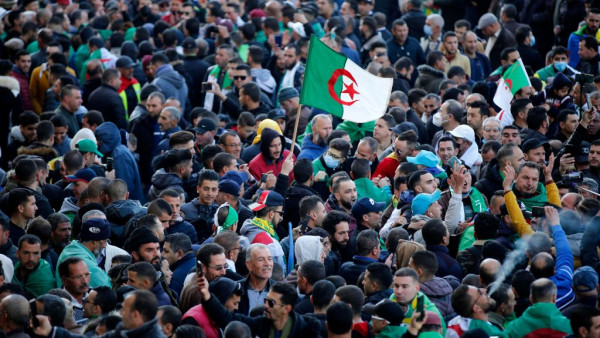The region’s groundwater aquifers have for years not been able to recharge due to less rain falls. [Getty]
In Algeria, protests and road blockages continue amid a severe shortage of drinking water that left taps running dry and residents queuing for hours to get access to water.
On social media, several users shared videos and pictures of protests and road blockages in Tiaret, 280 kilometres southwest of Algiers, early on Eid day, which is known for its high water consumption.
Images on these accounts show at least two roads blocked by stones and barricades between Tiaret and the neighbouring towns of Frenda and Bouchegouf.
No local public or private media have reported on this.
“They promised us a solution before Eid, but here we are still struggling to find drinking water. Many people had to postpone the Eid slaughter because of the shortage,” says Nader, a resident of Tiaret, to The New Arab.
TNA has contacted local authorities in Tiaret for updates on the solutions for the shortage, but no one was available to answer by the time of publication.
Des “émeutes de la soif” ont éclaté en Algérie. Et presque personne n’en parle…
Ça s’est passé à Tiaret, dans le nord du pays. Selon l’agence Associated Press, des émeutes ont éclaté et des feux ont été allumés.
Le calme serait revenu, mais la situation sur place reste… pic.twitter.com/HBLtqFzpEW
— Vakita (@vakitamedia) June 17, 2024
About 40 kilometres from Tiaret, in Rahouia, dozens of residents gathered on Monday and “prevented the mayor from leaving the district headquarters until he listened to their concerns,” reported AFP.
The region, located on a semi-arid high desert plateau increasingly affected by extreme heat, gets its water from three dammed reservoirs that are shrinking as temperatures spike and fewer rainfalls.
Since May, the rivers in Tiaret and the Bakhadda dam, the area’s only water supply source, have been dry.
The region’s groundwater aquifers have for years not been able to recharge due to fewer rainfalls.
In early June, the Tiaret region witnessed the first “thirst protests” with protesters burning tyres and blocking roads around the city.
Facing a raging “thirst uprising,” President Tebboune convened a council of ministers on 2 June and ordered the “ministers of the interior and water resources to develop an urgent and exceptional program” within forty-eight hours.
The next day, the two ministers, Brahim Merad and Taha Derbal, travelled to Tiaret and presented a plan to resolve the issue “before Eid al-Adha.”
The minister of water resources also commissioned a supply system for the city from nearby wells and connected it to the network within two weeks.
Residents say this partially solved the problem in the city centre, but not in other neighbourhoods.
Since Tebboune’s election in December 2019, protests have been sporadic in Algeria amid rising repression and arrests against opposition to his regime.
The North African country is set to hold its second presidential race this September since the end of the Hirak uprising.
President Tebboune has not yet announced whether he will run for a second term, but his intense media presence, inaugurating projects in Algeria and participating in international events, suggests that the 78-year-old politician has no plans to leave the Mouradia Palace anytime soon.

